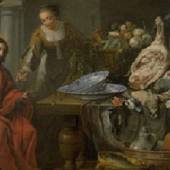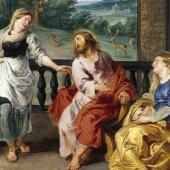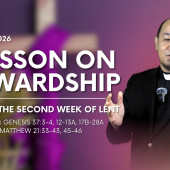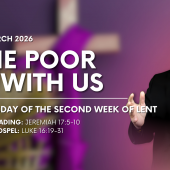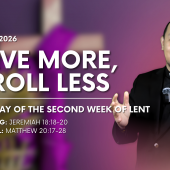Fight the good fight of faith!
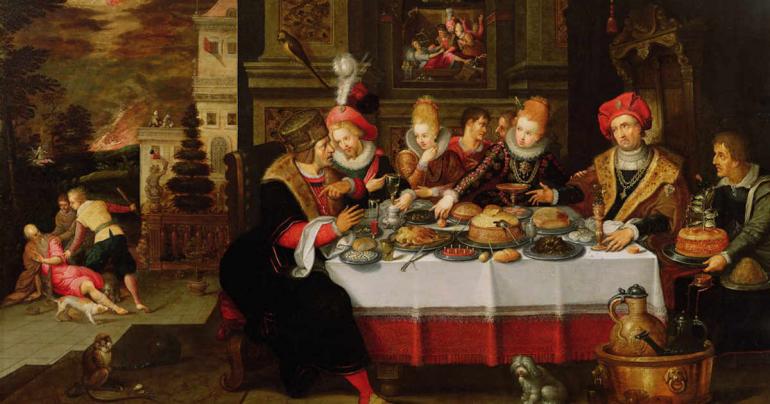
September 28, 2025 Twenty-sixth Sunday in Ordinary Time
Daily Readings: Amos 6:1a, 4-7; Psalm 146:6-10; 1 Timothy 6:11-16; Luke 16:19-31
The tone of the First Reading from 8th century BCE Hebrew Prophet Amos is one of blatant condemnation. The first ones to be condemned are the leaders and the richest who wield power and authority in Zion and Samaria, namely the Southern Kingdom and Northern Kingdom. Their lifestyle is scandalous. They enjoy all kinds of comforts and privileges. They have no concern for the wellbeing of the people, be it spiritual or economic. They sleep in beds of ivory, lie down in couches and eat sumptuous food. Their hobbies are self-centred and self-serving. They are known for their self-indulgences. There is no room for the other, the poor and the marginalized. Joseph is in ruin. Joseph refers to the Northern Kingdom and the tribes of Ephraim and Manasseh who occupied them. They are sons of Joseph. Amos foretells that they will be the first ones to go to exile. It happened exactly. In 732-731 BCE, the Assyrians took them away into their land for exile. The Old Testament does not have much to say about what happened to them in Assyria. Social justice demands that rich people do something to uplift the poor and make their welfare programmes that bring the last and the least to prominence. Unfortunately, the chosen people of God utterly failed in this regard.
The Responsorial Psalm describes the person who will be called ‘Blessed’. S/he must keep faith forever, secure justice for the oppressed, gives food to the hungry. The Lord sets captives free, gives sight to the blind, raises up those who are bowed down, loves the just and protects strangers. He sustains the fatherless and the widows. Therefore, the psalmist invites and encourages his soul to praise the Lord.
The Second Reading is taken from St. Paul’s First Letter to Timothy, the first Bishop of Ephesus. He was one of the favourite disciples of St. Paul. He is one of the most noteworthy leaders of the second generation of Christianity. He was a constant companion in Paul’s missionary journeys and co-author of a few letters together with Paul. In spite of being a son of a Jewess mother and gentile father, he grew up spiritually and became a “son of Paul in faith”. Being a bishop, Timothy was fearful and hesitant. Fondly addressing him as a man of God, he urges him to shun any love for money which is a root of all kinds of evil. Paul continues, “In their eagerness to be rich some have wandered away from the faith and pierced themselves with many pains” (1 Timothy 6:10). Therefore Paul exhorts him to “pursue righteousness, godliness, faith, love, endurance, gentleness”. Paul charges Timothy “to keep the commandment without spot or blame until the manifestation of our Lord Jesus Christ” (1 Timothy 6:14). Every person who is called to be a minister of the Word of God and custodian of the Sacraments is expected to live in a manner that is expected of him. Failure in this responsibility brings shame and dishonour.
The Gospel Reading from St. Luke presents the unique parable of the rich man and Lazarus. It is found only in St. Luke’s Gospel. The rich man has no name. He fits into those characters found in Samaria and Zion at the time of Amos. He also possesses all the qualities of those people whose behaviour Timothy should shun. He is condemned not because he was rich and lived an opulent life but because his eyes, minds and heart could not go beyond his table, bed and surroundings. He is insensitive to people and to their situation. We don’t know whether he took note of Lazarus sitting outside the gate. The name Lazarus derives from Hebrew El’āzār which means “God is my help”. It is said that those who don’t have anyone to help they have God. The name of Tamil layperson saint Devasahayam is the Tamil translation of the name Lazarus. The beggar in the parable is seated at the gate of the rich man. We are not sure if he used to beg him but after his death, the rich man would beg him. Dogs were his only companions who had something to eat from the sores of this unfortunate man. Dogs were animals despised by the Jews. A concrete reversal of fortune takes place when both of them die. Lazar finds himself in the bosom of Patriarch Abraham while the rich man struggles in agony amidst the flames.
The rich man is a victim of ‘sin of omission’. It is the inability or non-willingness to what one should have done with his/her riches. Religious and moral duty demands a rich man to reach out to the needy. There was no need for the rich man to go in search of the poor and needy in foreign countries. It was enough to see outside the gate and share a little bit of his food. He pleads Abraham for himself and for his brothers who are on the earth. The fire of hell transforms his life. The man who could not look outside the gate now looks up to Abraham. The man in purple and fine linen is naked in hell while the half naked Lazarus is clothed with eternal life. Abraham’s reply amazes us while it baffled the rich man. If someone does not positively respond to the Sacred Scriptures, that person will not be saved. Even someone from the dead will not be able to persuade them. All that is required to make us righteous is found here itself: Holy Mother Church and all her teachings, the Holy Bible, consecrated women and men are available here itself. They are indeed sent by God!
Call to Action: We who can afford a comfortable life must make efforts to reach out to our less fortunate brothers and sisters. The measuring rod of holiness is the corporal and spiritual works of mercy advocated by Pope Francis.
Radio Veritas Asia (RVA), a media platform of the Catholic Church, aims to share Christ. RVA started in 1969 as a continental Catholic radio station to serve Asian countries in their respective local language, thus earning the tag “the Voice of Asian Christianity.” Responding to the emerging context, RVA embraced media platforms to connect with the global Asian audience via its 21 language websites and various social media platforms.









